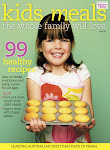Keeping the family regular
Babies may become constipated if their poo is dry and crumbly, or like pellets. This commonly occurs around the time they start solids.
Constipation is a difficulty passing a hard bowel motion (poo), causing pain and discomfort. A healthy diet, having enough to drink, exercise , correct toilet training and regular toilet habits are important to prevent and help treat constipation in children and adults. Chronic infant constipation may require expert advice from a Dietitian or GP.
Constipation in Adults
The cause of problems such as constipation are usually dietary related, commonly not enough fibre or a lack of water. Other issues affecting the regularity of your system could include the serving sizes of your meals and how often you eat. The best way of adding fibre to your diet is choosing wholegrain products and increasing the quantity of fruits, salads and vegetables . This means a minimum of two servings of fruits and five serves of salad or vegetables every day. For many people, however, the amount of fruits and vegetables that are necessary may be inconveniently large or may not provide adequate relief from constipation. In this case a fibre supplement can be useful.
Increased gas (flatulence) is a common side effect of high-fibre diets. The gas occurs because the bacteria normally present within you colon are capable of digesting the fibre to a small extent. All fibres, no matter what their source, can cause flatulence. By gradually increasing the fibre in your diet you can minimize the amount of gas produced.
When increasing the amount of fruits, vegetables and grains, it is recommended that you drink plenty of water to keep the stools soft so they pass through the bowel easily.
Constipation in Babies
Breastfed babies are hardly ever constipated, although they may not have a bowel motion for several days or up to a week. Even then, their poo will usually be soft. Many babies strain and go red in the face when doing a normal poo. This is not a sign of constipation unless the poo is hard and causes pain and discomfort. True constipation in babies is rare and should always be checked by a doctor.
Causes of constipation in babies include:
Formula too strong - if your baby is bottle-fed, make sure the formula is made up correctly, so that there is not too much formula powder for the amount of water.
Different formula - changes to the milk formula (especially swapping to ‘follow-on’ formula or cow’s milk).
Not enough fluid – especially in warm weather, bottle-fed infants require extra fluid such as cooled, boiled water between formula feeds. Breastfed infants may require more frequent feeds.
Solids not right for baby - use the correct solid foods for the age of your baby. Be aware that high fibre and wholegrain products are not suitable for babies under 12 months of age.
Starting baby on rice based cereals containing iron is important around 6 months of age however this may also cause poos to become dry and hard to pass. Using blended fruits and vegetables can help bulk and soften babies poos.
4 recipes to help make you and baby more regular
Vegetable Bake – Family and blended for babies from 7 months
250g dried penne pasta
1 onion finely chopped
2 tsp olive oil
50g olive oil margarine
50g (1/3 cup) plain flour
375 g crushed tomatoes
1 cup corn kernels
1 zucchini sliced
1 carrot sliced
1 head broccoli cut into florets
145g (1 1/2 cups) coarsely grated cheddar
Method
Preheat oven to 200°C
Cook pasta in a saucepan of boiling water following packet directions. Drain.
Heat the oil in a large saucepan over medium heat. Add the onion, corn, zucchini, carrot and broccoli and cook, stirring, for 5 minutes or until the vegetables soften. Set aside.
Melt the olive oil margarine in the pan. Add flour and cook, stirring, for 1 minute. Remove from heat. Gradually stir in the canned tomatoes. Place over medium heat and cook, stirring, for 2 minutes or until the sauce thickens.
Add the pasta, vegetable mixture and 1/2 cup of cheese to the sauce. Spoon pasta mixture into an ovenproof dish.. Sprinkle remaining cheese over pasta.
Bake for 40 minutes or until golden. Serve with mixed salad leaves, if desired.
Apricot balls - Family
11/2 cups dried apricots
1 table caster sugar
1 cup water
¼ cup plain flour
2 table olive oil
2 tablespoon desiccated coconut
11/2 cups natural muesli
place apricots, sugar and water in saucepan, bring to boil, cover and simmer for 12 minutes. Let cool
place apricot mixture, flour, oil, coconut, muesli in food processor and process until mixed.
Roll into balls (about 1 tablespoon each and chill).
Falafel Bites – Family and suitable for baby from 7 months
400g can chick peas
¼ onion finely chopped
½ teaspoon cumin powder
½ teaspoon ground coriander
1 clove garlic
1 tablespoon flour
Place all ingredients in food processor and blend till smooth.
Roll tablespoon amounts into balls
Shallow fry in olive oil or canola oil
Drain on paper towel
Serve immediately
Fruit Compote – suitable for baby from 6 months
1 apple peeled and chopped
1 pear peeled and chopped
3 dried apricots
2 prunes
½ cup water
place all ingredients in microwave proof container and cook on high for around 8 minutes or until soft. Blend all ingredients and cool.
Mix 3 spoon fulls of fruit mix with 1 tablespoon of plain yoghurt
Note: for storage place spoonfuls of fruit into an ice cube tray and freeze. Cubes can be thawed and mixed with yoghurt when needed
Babies may become constipated if their poo is dry and crumbly, or like pellets. This commonly occurs around the time they start solids.
Constipation is a difficulty passing a hard bowel motion (poo), causing pain and discomfort. A healthy diet, having enough to drink, exercise , correct toilet training and regular toilet habits are important to prevent and help treat constipation in children and adults. Chronic infant constipation may require expert advice from a Dietitian or GP.
Constipation in Adults
The cause of problems such as constipation are usually dietary related, commonly not enough fibre or a lack of water. Other issues affecting the regularity of your system could include the serving sizes of your meals and how often you eat. The best way of adding fibre to your diet is choosing wholegrain products and increasing the quantity of fruits, salads and vegetables . This means a minimum of two servings of fruits and five serves of salad or vegetables every day. For many people, however, the amount of fruits and vegetables that are necessary may be inconveniently large or may not provide adequate relief from constipation. In this case a fibre supplement can be useful.
Increased gas (flatulence) is a common side effect of high-fibre diets. The gas occurs because the bacteria normally present within you colon are capable of digesting the fibre to a small extent. All fibres, no matter what their source, can cause flatulence. By gradually increasing the fibre in your diet you can minimize the amount of gas produced.
When increasing the amount of fruits, vegetables and grains, it is recommended that you drink plenty of water to keep the stools soft so they pass through the bowel easily.
Constipation in Babies
Breastfed babies are hardly ever constipated, although they may not have a bowel motion for several days or up to a week. Even then, their poo will usually be soft. Many babies strain and go red in the face when doing a normal poo. This is not a sign of constipation unless the poo is hard and causes pain and discomfort. True constipation in babies is rare and should always be checked by a doctor.
Causes of constipation in babies include:
Formula too strong - if your baby is bottle-fed, make sure the formula is made up correctly, so that there is not too much formula powder for the amount of water.
Different formula - changes to the milk formula (especially swapping to ‘follow-on’ formula or cow’s milk).
Not enough fluid – especially in warm weather, bottle-fed infants require extra fluid such as cooled, boiled water between formula feeds. Breastfed infants may require more frequent feeds.
Solids not right for baby - use the correct solid foods for the age of your baby. Be aware that high fibre and wholegrain products are not suitable for babies under 12 months of age.
Starting baby on rice based cereals containing iron is important around 6 months of age however this may also cause poos to become dry and hard to pass. Using blended fruits and vegetables can help bulk and soften babies poos.
4 recipes to help make you and baby more regular
Vegetable Bake – Family and blended for babies from 7 months
250g dried penne pasta
1 onion finely chopped
2 tsp olive oil
50g olive oil margarine
50g (1/3 cup) plain flour
375 g crushed tomatoes
1 cup corn kernels
1 zucchini sliced
1 carrot sliced
1 head broccoli cut into florets
145g (1 1/2 cups) coarsely grated cheddar
Method
Preheat oven to 200°C
Cook pasta in a saucepan of boiling water following packet directions. Drain.
Heat the oil in a large saucepan over medium heat. Add the onion, corn, zucchini, carrot and broccoli and cook, stirring, for 5 minutes or until the vegetables soften. Set aside.
Melt the olive oil margarine in the pan. Add flour and cook, stirring, for 1 minute. Remove from heat. Gradually stir in the canned tomatoes. Place over medium heat and cook, stirring, for 2 minutes or until the sauce thickens.
Add the pasta, vegetable mixture and 1/2 cup of cheese to the sauce. Spoon pasta mixture into an ovenproof dish.. Sprinkle remaining cheese over pasta.
Bake for 40 minutes or until golden. Serve with mixed salad leaves, if desired.
Apricot balls - Family
11/2 cups dried apricots
1 table caster sugar
1 cup water
¼ cup plain flour
2 table olive oil
2 tablespoon desiccated coconut
11/2 cups natural muesli
place apricots, sugar and water in saucepan, bring to boil, cover and simmer for 12 minutes. Let cool
place apricot mixture, flour, oil, coconut, muesli in food processor and process until mixed.
Roll into balls (about 1 tablespoon each and chill).
Falafel Bites – Family and suitable for baby from 7 months
400g can chick peas
¼ onion finely chopped
½ teaspoon cumin powder
½ teaspoon ground coriander
1 clove garlic
1 tablespoon flour
Place all ingredients in food processor and blend till smooth.
Roll tablespoon amounts into balls
Shallow fry in olive oil or canola oil
Drain on paper towel
Serve immediately
Fruit Compote – suitable for baby from 6 months
1 apple peeled and chopped
1 pear peeled and chopped
3 dried apricots
2 prunes
½ cup water
place all ingredients in microwave proof container and cook on high for around 8 minutes or until soft. Blend all ingredients and cool.
Mix 3 spoon fulls of fruit mix with 1 tablespoon of plain yoghurt
Note: for storage place spoonfuls of fruit into an ice cube tray and freeze. Cubes can be thawed and mixed with yoghurt when needed







1 comment:
One thing i have always wondered is how much water to give a 3y 2y and 1y etc as for adults we say 6-8 glasses. I fill a tupperware drink bottle with water for my boys and get them drink all of it in a day.
Post a Comment